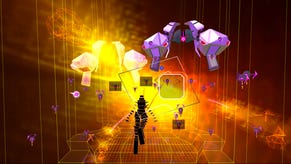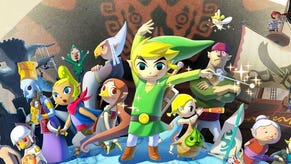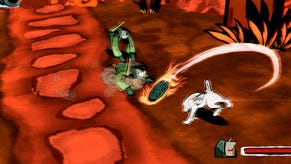Rez HD
Resynthesized.
Snap the Rez design apart, lay the pieces out on the table and you've little more than a wireframe Panzer Dragoon. Sure, it's been named by Underworld, custom soundtracked by Adam Freeland, graphic designed in a lab by Tron nanobots and rolled out into the look-games-can-be-intellectual battleground plastered with Wassily Kandinsky posters. But behind the frippery sits Space Harrier chewing acid at a science-fiction fancy dress party. There's no way to escape the fact that your character moves along a fixed path at a fixed speed, clicking on pop-up targets for points. At its heart, Rez is a good old-fashioned shooting gallery arcade game, albeit one stationed at a Butlins in Alpha Centuri.
But, even if you do ignore all the peripheral highbrow talk of Russian abstract painters and neurological foibles or the lowbrow hand-muffled giggling about a third-party sex toy peripheral and its rhythmic pulsing, the strong, assured core of this extraordinary game is somehow more than its constituent parts. Yes, you sit on an esoteric rollercoaster picking off line-art cubes as they streak by, but perform that kind of critical reduction and you'll not only miss Rez's destination but you'll also ruin the journey. And in Rez, the journey is everything. And in Rez HD, the journey is filmed by a Heliglimbal gyro-stabilised camera borrowed from the BBC's Planet Earth production team.
The orangey lines that delineate something from nothing, never too jagged or pixelly in the original, could now slice a cheese moon. Spread out across a widescreen canvas, the streaky pixel bomb explosions, circuit board backgrounds and ancient wireframe temples you fly through are finally brought into true focus, as if before we looked through a Dreamcast darkly but now we see in full (HD). The original version is included in the package but you can't escape the feeling that it's there less for completism's sake than for rude showboating on Q Entertainment's part.
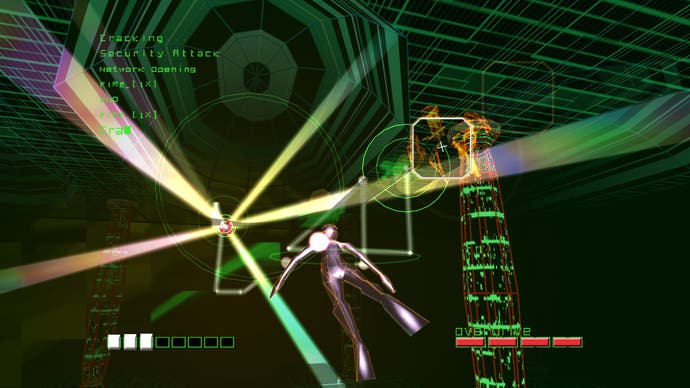
There's a whisper of plot: a sentient AI turned nasty - GLaDOS's grandmother perhaps - but as you hyperspace through the game's five stages, picking off each one's sub-boss before a final tussle to reboot her sinister programmed ARS, narrative exposition is as sparse as the game's Cosmic Smash-esque front-end. The ebb and flow of progress and retreat, cliffhanger and comic relief is all handled in play. Enemies drop blue power-ups that gradually increase your health. Collect enough and you evolve forms. Get hit by a stray bullet and you regress, strength and advancement moving up and down a slider controlled by your discrete successes and failures. Red power-ups add to a stock of 'Overdrives', the release of which acts as a Geometry Wars smart bomb to burn up everything in sight, a symphony of pyrotechnics to light up your widescreen and further frazzle your mind.
And the music. The music is important because without it we might not have Everyday Shooter, or Lumines, and because without it Rez would be a far less involved and poorer experience. The game's trance soundtrack is more than just a Jeff Minter-style aesthetic badge; it's more than just a signifier of creator Tetsuya Mizuguchi's musical tastes and intoxicating influences (although, of course, it is that too). Rather, it's weaved into the fabric of the experience. Every interaction with the game has its own sound effect: lock-ons emboldened by miniature hi-hat fips and thwacks, explosions acting as synth punches and, as you move through each level's ten layers, the soundtrack intensifies to match the drama. There are no bonuses for timing your actions with the bpm of the soundtrack but the way the samples are handled and locked to rhythms makes even a misfired bullet sound like a conductor's artful flourish.
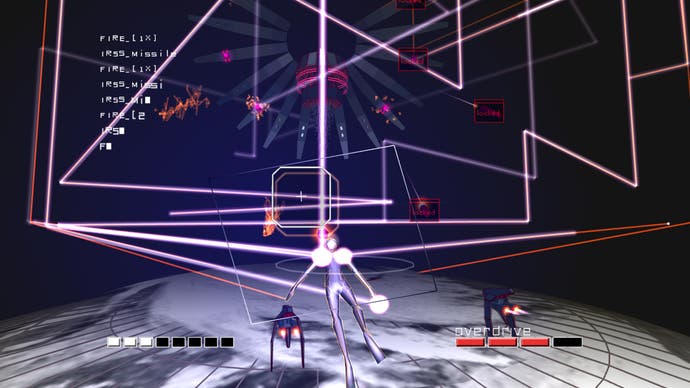
The framework that surrounds all of this has been left mostly untouched. Past the new Xbox Achievements, the original's extras stay put: the travelling mode (for practicing without fear of failure) and all of the original's bonuses and subtly signposted challenges are present and waiting. Likewise the sublime difficulty curve, calculated to within a notch of perfection, remains. The game heaves and builds through a pregnancy, the birth of its finale a transcendental moment in videogames as each previous boss re-emerges, augmented and awesome.
At the time of the original's release Rez attracted critical reaction ranging from unfettered recommendation to shrugging indifference: it was too new, too unusual, too unfathomable, too much the possibility of Emperor's clothes for some. But time has chosen to amplify the adulation, not the reservation and, as most of that reservation focused on the fact the game was short and expensive, they've been completely silenced by today's GBP 6.80 price point. Back in the day we said of the original: 'When Rez eventually turns up cheaply it will become indispensable, but until then it's a luxury.' Xbox Live Arcade is, then, our modern printing press: digital distribution transforming the expensive and exclusive into the affordable and inclusive. Joy has rarely come so reasonably priced and, whatever the price, videogames, rarely come so joyful. Indispensable, then.

